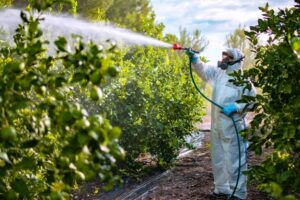The recent report “How the EPA’s lax regulation of dangerous pesticides is hurting public health and the US economy” by the Brookings Institution highlights ways the EPA is lagging behind the rest of the world in regulating pesticides to protect human and wildlife health.
The report lists approximately 85 agricultural pesticides that are still approved for use in the United States but have been banned or are being phased out in the European Union, China, and Brazil.
“Industrial agriculture relies on two types of chemicals: fertilizers and pesticides. The former boost soil fertility, making crops more productive, while the latter protect crops by controlling weeds (herbicides), insect and animal infestation (insecticides and rodenticides) and fungal/mold diseases (fungicides),” states an article by FoodPrint.
For the agricultural industry, pesticides are a game-changer. Weeding thousands of acres of crops mechanically or by hand is time-consuming and costly.
“The carpet-bombing approach to pesticide use is a hard habit to break,” FoodPrint continues. “Decades of using pesticides as the first and only line of defense mean that older, traditional knowledge and skills about pest and weed management have been lost, which leaves farmers out of options if and when the chemicals fail. Buying equipment and investing time and labor costs into alternative pest control methods can be restrictive for many farmers, especially those who have heavily invested in engineered seeds and pesticides.”
Two reports by the EPA’s own watchdog, the EPA Office of Inspector General (OIG), reveal failures with transparency and scientific integrity and demonstrate the Agency is aware of the issues with pesticide registrations.
- OIG report: “EPA Deviated from Typical Procedures in Its 2018 Dicamba Pesticide Registration Decision,” dated May 24, 2021. The report found that “the EPA’s 2018 decision to extend registrations for three dicamba pesticide products varied from typical operating procedures” and that EPA actions on the pesticide registrations “left the decision legally vulnerable, resulting in the Ninth Circuit Court of Appeals vacating the 2018 registrations for violating [the Federal Insecticide, Fungicide, and Rodenticide Act (FIFRA)] by substantially understating some risks and failing to acknowledge others entirely.”
- OIG report: “The EPA Needs to Improve the Transparency of Its Cancer-Assessment Process for Pesticides,” dated July 20, 2022. The report found the “EPA did not adhere to standard operating procedures and requirements for the 1,3-Dichloropropene, or 1,3-D, pesticide cancer-assessment process, which undermines public confidence in and the transparency of the Agency’s scientific approaches to prevent unreasonable impacts on human health.”
Changes to the regulatory framework are necessary
The FIFRA regulations themselves make it extremely difficult to revoke registrations unless a pesticide company requests the revocation, states the Brookings Institution article.
“EPA is required to explore alternatives to revoking the approval of a pesticide (even though there is no similar requirement to explore alternatives to approving a pesticide) and, above all, account for how its actions will affect the agricultural economy,” Brookings Institution says. “Pesticide makers can have multiple reasons for not wanting to keep a product registered in the U.S., and economic considerations often drive those decisions rather than public health concerns. … In the few cases when the EPA has taken action to remove a pesticide due to public health concerns, the removal was often too slow or incomplete (and only implemented after many lawsuits to force action).”
Big business
The U.S. pesticide industry generates $14 billion, with more than 60% utilized for agricultural purposes, reports FoodPrint. The EPA’s most recent report states the United States used 1.1 billion pounds of pesticides in both 2011 and 2012, which equals approximately 23% of worldwide usage in that time frame.
A better way
Good soil health practices and crop rotations are better ecosystem management practices that build insects, plants, and microorganisms to more naturally ward off weeds and disease, FoodPrint adds. Additionally, better timing of the planting of crops to outcompete the weeds, the use of cover crops, and the strategic timing of tilling and weeding reduce the need for pesticides.
The Brookings Institution report suggests three measures to “save ourselves from ourselves”:
- Align U.S. policies with both the Stockholm and the Rotterdam Treaties, which provide international registrations for dangerous chemicals and offer protection from 43 different pesticides.
- Spur innovation through passing bills for tougher regulations that will put pressure on pesticide companies for safer chemicals.
- Communicate confidently and unapologetically that change is necessary and will benefit everyone in the long run.
“It is hard to effectively argue that agricultural production would suffer by simply taking the worst-of-the-worst pesticides off the market, given that the four other largest agricultural economies in the world are doing just fine without those pesticides,” continues the Brookings Institution article. “These are our competitors in the global agricultural market, and they have just as much interest as the U.S. does in keeping costs low and agricultural production high. They make it work, and we can, too. In fact, in a global economy we do ourselves a disservice by being so far out of sync with the rest of the world.”

